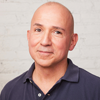
I don’t know where I’d be without my friends. While I’m close to my family, they moved to Los Angeles 25 years ago and I chose to stay here in Chicago. My family is a FaceTime call away, but when I’ve needed someone literally by my side, it’s been my friends who’ve been there.
When I received my HIV diagnosis, I was paralyzed with fear. It was only after the strongly worded urging of my boyfriend Eric at the time that I took the next step and got into care. When I was homebound during the most difficult days of my anal cancer journey, a few of my friends sent or dropped off soup and ice cream—food that was mercifully soft and easy to digest. My roommate Andy knew I needed laughter and not pity to pull through. And then there’s my friend John, who would pick me up from the hospital after my surgeries, partly because he thought it was funny to see me so chatty while feeling the after effects of anesthesia.
That’s not to say that there haven’t been times I felt utterly alone with my HIV, my butt cancer (as I prefer to call it), or with whatever else troubling me. You can have wonderful, caring friends, and there can still be moments when you feel the profound absence of friends.
As people living—and now aging—with HIV, we are at a point where many of us must look to each other for support. That’s why it was deeply moving to learn that HIV activist Bryan C. Jones was about to undergo chemotherapy and radiation treatment for his fourth bout with cancer and that some of his friends were going to Cleveland to keep him company, including his dearest friend Davina (“Dee”) Conner.
There are many different kinds of friends. Bryan and Dee have a deep abiding friendship. They have nicknames for each other, names they’ve shared for so long, they don’t even remember when or how they came up with them. They’re just Jethro and Ella.
Entering into the picture, in every sense, is photographer Sean Black. An activist himself, Sean came to know Bryan and Dee through his work, and developed a close friendship with them. Sean wanted to be there for his friend, but he also wanted to document this moment when
friendship comes into service for the people we love. A camera clicking and whirring during such an intense personal experience would be the ultimate intrusion, so it says something that Sean’s presence was instead a part of the moment. You can share in that experience with this issue’s cover story “Taking care of our own,” a photo essay shot by Sean, written by Dee and with a personal reflection by Bryan.
Also in this issue, the second installment of our four-part series, “Partners in Research”, offers firsthand accounts by long-term survivors, including the perspective of an HIV-negative partner, in the search for an HIV cure. Also featured is a resilience framework for clinicians to consider so that they can provide support and care for participants in cure research.
There was plenty of sex talk at CROI, reports associate editor Enid Vázquez. The conference highlighted efforts to "beat off" sexually transmitted infections, particularly through the use of the antibiotic doxycycline as post-exposure prophylaxis—doxy-PEP. Separate studies found that long-acting PrEP was safe, effective for—and well received by—adolescent cisgender girls and Black folk in protecting them from HIV.
“Anyone who wants to see the end of the HIV epidemic in the U.S. should pay attention to this case,” writes attorney Scott Schoettes in his Poz Advocate column. A conservative judge in Texas has ruled that the Affordable Care Act (“Obamacare”) violates the religious freedom of businesses by forcing them to provide insurance that includes preventive services—such as PrEP—that go against their religious beliefs. The case is expected to go all the way to the Supreme Court.
Being true to who you are is hard work, says columnist Bridgette Picou in Being Bridgette, but it can also be healing. Her words speak to all of us.
Read the responses to “The Category Is” and the question we posted on social media: Do you have a support network you can turn to when you need care? Even as some people said they had no support and felt cut off, a few other commenters reached out to them.
“Hey, Rob. Long-time warrior here, too,” replied one person in response to a post. “Always around to listen and help.”
It’s up to each of us to reach out and look out for one another. We all need a quality of friendship that makes us feel connected and supported.
You are not alone.


